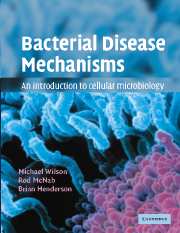Book contents
- Frontmatter
- Contents
- Preface
- Abbreviations used
- Chapter 1 An introduction to bacterial diseases
- Chapter 2 Bacterial cell biology
- Chapter 3 Molecular analysis of bacterial virulence mechanisms
- Chapter 4 Communication in infection
- Chapter 5 The mucosal surface: the front line of antibacterial defence
- Chapter 6 Immune defences against bacteria
- Chapter 7 Bacterial adhesion as a virulence mechanism
- Chapter 8 Bacterial invasion as a virulence mechanism
- Chapter 9 Bacterial exotoxins
- Chapter 10 Bacterial evasion of host defence mechanisms
- Chapter 11 Bacteria in human health and disease: the future?
- Appendix A Glossary of terms used
- Appendix B Brief descriptions of bacteria frequently mentioned
- Index
- Plate section
Preface
Published online by Cambridge University Press: 05 June 2012
- Frontmatter
- Contents
- Preface
- Abbreviations used
- Chapter 1 An introduction to bacterial diseases
- Chapter 2 Bacterial cell biology
- Chapter 3 Molecular analysis of bacterial virulence mechanisms
- Chapter 4 Communication in infection
- Chapter 5 The mucosal surface: the front line of antibacterial defence
- Chapter 6 Immune defences against bacteria
- Chapter 7 Bacterial adhesion as a virulence mechanism
- Chapter 8 Bacterial invasion as a virulence mechanism
- Chapter 9 Bacterial exotoxins
- Chapter 10 Bacterial evasion of host defence mechanisms
- Chapter 11 Bacteria in human health and disease: the future?
- Appendix A Glossary of terms used
- Appendix B Brief descriptions of bacteria frequently mentioned
- Index
- Plate section
Summary
It is unlikely that even Steven Spielberg could do justice to the history of Bacteriology, with its fascinating story of ignorance, blinding enlightenment, industrial success and an ultimate denouement that the reader is living through. This story is populated with some of the most fascinating characters in science such as Antonie van Leeuwenhoek, Louis Pasteur, Robert Koch, Élie Metchnikoff, Paul Ehrlich, Alexander Fleming and Selman Waksman, to name but a few.
With some 5000 years of recorded human history, it is stunning to realise that it was only in the 17th century that we saw bacteria for the first time, through the ‘magic’ of Antonie van Leeuwenhoek's single lens microscopes. It was only 150 years ago that Pasteur firmly established the concept of the microorganism. In the 30 years spanning the last two decades of the 19th century and the first decade of the 20th century, in what is the proverbial ‘twinkling of an eye’, the major human bacterial pathogens were identified. No sooner had they been identified than vaccination for bacterial diseases (e.g. anthrax) was developed. Ehrlich developed the first antibacterial, Salvarsan, in 1910 and penicillin was discovered by Fleming in 1929, although introduced into clinical practice only in the 1940s. In the 1940s and 50s, Selman Waksman and others developed new antibiotics such as streptomycin from soil organisms. However, antibiotics proved to be the death-knell of bacteriological research and by 1969 the American Surgeon General felt able to say ‘we can close the book on infectious diseases’.
- Type
- Chapter
- Information
- Bacterial Disease MechanismsAn Introduction to Cellular Microbiology, pp. xvii - xxPublisher: Cambridge University PressPrint publication year: 2002

